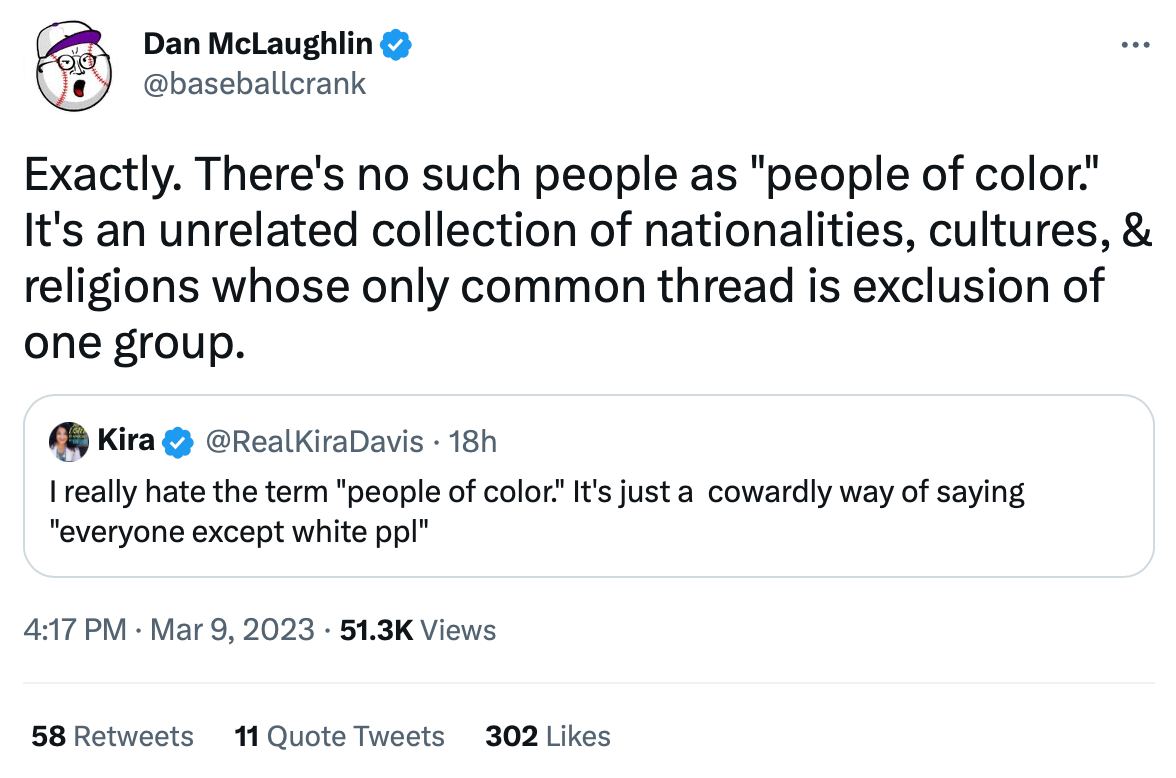People of "People of Color"
The categories we use are exclusionary by nature—but that, by itself, doesn't tell you if they're bad
Although I’m Hispanic, I’m white Hispanic. I live in a country that is majority white. Which means that, for myself and lots of others, “people of color” is like so many other terms in society whose use or non-use simply isn’t a matter of great personal interest. I don’t mean that dismissively (as in, this topic doesn’t matter) but literally (as in, I don’t have a personal stake in this discussion).
But that’s precisely why I have no problem with it—because the people who fall under it don’t tend to mind it. In other words, “people of color” is the sort of term whose ongoing status in society should be determined by those it refers to. Do they like it? Do they want others to use it? Etc.
And despite being a bit of an overhyped concern, I would make the same point about “Latinx.” The people it applies to have repeatedly made it clear it’s not a term they prefer. So we should ditch it. Shouldn’t be complicated.
Obviously if you’re in a competitive arena—such as politics or sports—using categories your opponents don’t prefer can be fine. Doing so can even be necessary as a way to counteract someone’s overly sanitized description of their own project. But categories used to group people racially ought to have significant buy-in from those it would include.
In a recent tweet, Kira Davis said she hates the term “people of color” because it’s a “cowardly way” of excluding white people without being explicit about it. Right off the bat we’re treated to a linguistic grievance that exhibits zero curiosity for the term’s historical context. Davis’s complaint is that the term’s design is to exclude white people, as if people of color workshopped a term to stick it to whites, to deprive them of inclusion into their elite company.
Dan McLaughlin, conservative writer for National Review, agreed with Davis and added that the term’s “only common thread” is that it is exclusionary of white people. His reasoning is that since “people of color” covers folks of various nationalities, cultures, and religions, it is therefore an “unrelated collection” only held together by its exclusion of white people.
McLaughlin is right that “people of color” is, in an important sense, supra-national, -cultural, -religious. But when he concludes from this that “people of color” is therefore an “unrelated collection,” that becomes the argumentative step he uses to suggest the category basically exists to discriminate against white people.
The underlying reasoning is something like this: If “people of color” wasn’t powered by a progressive project hell bent on discriminating against the most culturally hated group today, white people, would we still use it? No, he would say, because it doesn’t capture a nationally/culturally/religiously consolidated demographic. Its only function is to exclude whites. That’s the Davis-McLaughlin thesis.
But there’s a way to make sense of the term that doesn’t conclude any of that; a way to see “people of color” as absolutely constituting a related collection—not by nationality, culture, or religion, but by historical exclusion from the societal standard.
What justifies the creation and use of an exclusionary group category like “people of color” is, if it is justified in the first place, the constituent peoples’ shared status as racially non-normative in society. It’s technically exclusionary, yes—but as a consequence of the people who fall in that category being collectively excluded from the racial default to begin with. Kind of like the way normal people aren’t troubled by the presence of B.E.T., or Black Entertainment Television; its entire reason for being is on account of the other channels historically being less hospitable to black entertainers.
The categories we deploy carve up our complex realities into discrete units of meaning. This is an inherently discriminatory act—in the technical sense of requiring that we make discriminations among things in order for communication to be possible and even fruitful. The overwhelming majority of categories are exclusionary by nature—which makes sense, of course, since a category’s function is to group related items, and that’s only possible against a backdrop of difference.
But whether something is exclusionary doesn’t by itself tell you anything about whether it is morally justifiable. We have to ask the follow-up: Okay, so this category, like nearly all categories, has an exclusionary element, but is it doing its excluding in a morally troubling way?
This discussion reminded me of philosopher Harry Frankfurt’s guiding insight in On Inequality that economic inequality isn’t an intrinsically problematic state of affairs; rather, the problem we have to solve is reducing “poverty and excessive affluence.” This is not a strange insight within philosophy—a key cog of Rawlsian liberalism, the difference principle, holds that inequalities are justified so long as they make the most disadvantaged better off relative to other social configurations, including egalitarian ones. In other words, by itself, the presence of inequality doesn’t automatically mean a bad state of affairs. Someone who believes a particular form of inequality is bad needs to make a case for why the inequality they are talking about is in fact suboptimal.
Bringing it back to “people of color,” a term being exclusionary is not enough to determine whether it’s a bad one to use. That’s because exclusionariness isn’t inherently morally problematic. The fact that we exclude murderers from free society is a good thing.
If you’re more troubled by a term’s exclusion of white people than you are about the presence of racial disadvantage that provoked the term’s emergence in the first place, I’d say your priorities are off.




I find the term "people of color" grating for the opposite reason. It flattens different groups of people with wildly divergent cultural and economic experiences into a single positive category. Somebody who grew up in abject poverty in West Baltimore has little in common with a wealthy Hindu immigrant from India working at a San Francisco startup or a second generation farmworker in Iowa who is hustling to help his extended family in Mexico. All that binds these groups together is having possibly experienced racism from individuals in a white majority population/culture because of their skin color. Treating them as a positive group unconsciously emphasizes the salience of "whiteness" more than if we didn't try to group them together, and erases their specificity. I'm white, so like you, I don't have much of a stake in what all these groups would prefer to call themselves, but I suspect that the only people who are really invested in this term are professionals who like to talk about the politics of race as an abstraction. This seems very condescending to me, as if being the object of racism because of skin tone is all that a "non-white" culture or ethnic identity can consist in.
I find it more useful to use terms that actually indicate why such-and-such a category is salient in sociological, rather than political terms. I prefer, for instance, to think about "people of color" as "racial minorities" in a US context. Everyone understands in the US that we have a dominant white-majority native English-speaking population (for now), a history of slavery/racism/discrimination/etc., and various kinds of negative economic disparities that affect minority populations disproportionately. Skin color might matter ideologically for racists, but what matters sociologically is minority status indexed against other factors like economic prospects, culture, family structure, language geography, etc. If we're comparing the US with another country, like South Africa where different racial minorities are either politically dominant (Afrikaaners, other white residents) and politically oppressed ("colored" populations), we might want to add clarification to the term using adjectives like "politically powerful" or whatever.